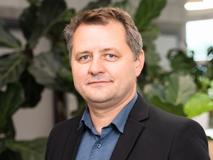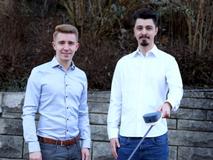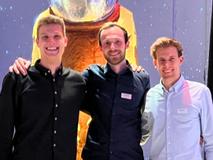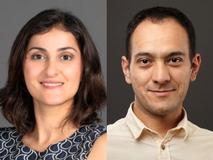CHF 10,000 for a device for rapid on-site drug detection, united generative AI tools for collaborative filmmaking, AI-based white canes, a packaging solution for e-commerce, and comprehensive fetal-maternal monitoring
26.05.2025
Altiscreen, narrae.studios, NextGuide, SendMeBag, and VidaSense were selected at Venture Kick's first financial and entrepreneurial support stage. Their projects offer a truly portable, easy-to-use device for rapid, on-site drug detection; transform voice notes into personalized videos through AI on WhatsApp and Telegram; improve visually impaired mobility through AI-based white canes; develop a reusable shipping bag that is easy to return via public mailboxes; and deliver comprehensive fetal-maternal monitoring through a non-invasive, lightweight wearable device.
 |
 Altiscreen: CEO Leonard Dumea
|
 narrae.studios CEO Pierre Esparsa, CTO David Souto, and CFO Mauro Riggio
|
 NextGuide: CEO Alexander Bayer & CTO Thomas Baye
|
 SendMeBag: Co-Founders Joshua Kohler, Sandro Küng, and Remo Zemp
|
 VidaSense: CEO Dr. Naeimeh Behbood & CTO Dr. Gürkan Yilmaz
|
Altiscreen is addressing the critical need for rapid, on-site drug detection to help reduce healthcare costs, workplace accidents, and road fatalities. The company provides a truly portable and user-friendly device that delivers accurate results in just minutes, in contrast to existing solutions that are often bulky, slow, or complex.
Funding from Venture Kick will enable Altiscreen to produce its first commercial batch and enhance business development. This support will accelerate manufacturing, market entry, and partnerships, helping to bring its rapid and portable drug detection device to market.
narrae.studio: Uniting Generative AI Tools for Collaborative Filmmaking
Users can convert voice notes into personally styled films via the company's innovative "Voice Shorts" technology, embedded in WhatsApp, without any prompts, scripts, or filmmaking knowledge.
Founded by CEO Pierre Esparsa, CTO David Souto, and CFO Mauro Riggio, narrae.studio is currently being accelerated by EHL's Innovation Hub. The platform focuses on solving the Video Paradox: 70% of mobile traffic is video, yet it's created by only 12% of users. Narrae makes filmmaking accessible to the remaining 88%, tapping into the 7 billion WhatsApp voice notes shared daily—a number that has doubled every year since 2020. A prepaid system charges CHF 2 per minute of film, with 50% profit margins. Built on proprietary AI models, narrae.studio prioritizes mobile optimization, encryption, and data privacy. To drive growth, the platform will distribute free credits to influencers and community leaders, leveraging built-in virality.
Venture Kick funds will help connect the prototype with storytellers, artists, and community leaders who would otherwise not have been able to create films from their important but unheard stories, paving the way to build an ultra-specialized Small Language Model at the service of global stories.
NextGuide: Improving visually impaired mobility through AI-based white canes
Traditional white canes offer only basic tactile feedback, while guide dogs, although more effective, can be prohibitively expensive, costing up to CHF 65,000. The lack of adequate guidance contributes to a higher incidence of accidents among visually impaired individuals, resulting in increased healthcare costs for insurers. NextGuide aims to bridge this gap by providing users with AI-powered navigation and obstacle avoidance, promoting greater mobility and independence.
SendMeBag: The reusable packaging solution for e-commerce
SendMeBag addresses the escalating waste problem caused by single-use packaging in e-commerce. Each online order generates cardboard and stuffing that ultimately end up in the trash. As e-commerce continues to grow, so does the resulting packaging waste, and most customers are looking for more sustainable options.
VidaSense: Comfort in fetal-maternal monitoring, confidence in prenatal care
Existing fetal monitoring devices primarily use ultrasound technology, which presents several limitations. These include high sensitivity to sensor positioning, the need for gel, bulky equipment design, restricted mobility for expectant mothers, and the requirement for frequent readjustments by healthcare personnel.


